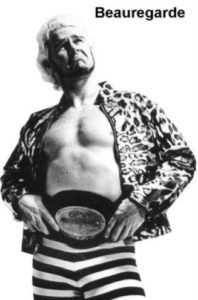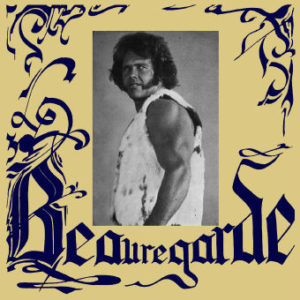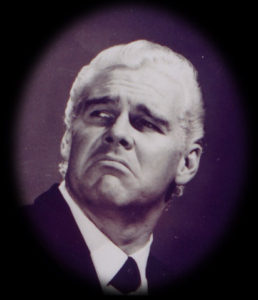
Professional wrestling and rock ‘n’ roll have walked hand in hand for decades. You will find that both lifestyles are similar to one another as you delve deeper and hear some of the crazy stories that have been told. The True Sport of Kings has its own tales of drugs, booze, debauchery, and life in the fast lane that rival those you have read about your favorite rock ‘n’ rollers! Wondering about the two worlds colliding was never a question of “if,” but more like “when.” I always suspected that the WWF was not the first to make the Rock ‘n’ Wrestling Connection; they just happened to take the idea mainstream. Unfortunately, wrestling’s history can be a tough road to navigate even with the internet aiding in research.
Who did made the connection first? Former Fabulous Freebird (and current WWE producer) Michael Hayes is the easy answer, as he is fond of taking credit for bringing rock ‘n’ roll into professional wrestling. Just ask him! He’ll tell you all about how the Freebirds were wrestling’s first rockers in their days with the Georgia territory! He’ll tell you all about how “Badstreet USA” was the first Rock ‘n’ Wrestling record and video! However, the first record released by a wrestler came out nearly ten years before Hayes even tried on a pair of wrestling boots! We will now board the MUTHA SHIP so we can go back in time and get acquainted with an obscure wrestling legend by the name of Beauregarde!

Portland wrestling fans of the late ‘60s and early ‘70s probably have plenty of stories about Beauregarde. He was arguably the territory’s most hated wrestler before Playboy Buddy Rose ascended to those heights in the latter half of the decade. His finishing move, the Thumb, put down many an opponent! Old school fans are likely to reminisce about Beau’s outlandish costumes worn to support his ongoing claim to be related to every historical figure throughout time that you could name—from Cleopatra to Nathan Hale. They might tell you about how Beauregarde pre-dated Ric Flair as the blonde-haired playboy who owned over twenty custom-made suits and practically had women lining up to find out why he was nicknamed “The Sensation of the Nation.” Memories of his tag teams with Tough Tony Borne, Moondog Lonnie Mayne, Dutch Savage, and the Claw are likely to stand out as well. Perhaps they would tell you about the time when Beauregarde went on TV and threatened to have the Easter Bunny murdered! You are probably snickering right now, but that interview gave many kids nightmares the day before Easter!
Those same fans might also tell you that when it came to playing music, Beauregarde was about as good at rock ‘n’ roll as he was at wrestling! Years before stepping into the squared circle, he attended a Chubby Checker concert as a college student. Apparently, Chubby saw him dancing in the crowd and invited the future wrestler onstage to perform the Twist with him! Perhaps that was the moment when his dream to release a record began. Beau entered the music world after finally becoming a fan favorite thanks to The Claw turning on him in a tag team title defense against Mr. Fuji and Haru Sasaki. Self-released in 1971, the “Testify” b/w “I” 45 was a local smash hit! Beauregarde even directed a video for “Testify” that was featured on TV—you can easily find it on YouTube—in which the grappler is shown handing out money to the local homeless, dancing on the Lovejoy Fountain, and popping wheelies on his badass three-wheeled chopper! Radio airplay for “Testify” was scarce to nonexistent, so playing the video on Portland Wrestling was the ticket for all of those record sales. Beauregarde then followed the single with an LP that took things a little bit further than the “Testify” 45.

Beauregarde knew a good musician when he heard one. He employed the services of two teenage whiz kids named Greg Sage and Dave Koupal, both of whom wrote their own entry in Portland music history as members of the Wipers! I assume most PORK readers are at least somewhat familiar with them, right? Beau came across Greg by chance through a mutual friend and was impressed with his ability, telling the seventeen-year-old that he played like Jimi Hendrix. Blown away by the praise, young Sage took him up on his request to play guitar on the wrestler’s album! Greg tells a great story about an argument with the studio engineer over ideas of how to properly mic the guitar amp. Apparently, the engineer grabbed Sage by the collar and dragged him into his office to show him his framed certificates while telling Greg that he had no idea what he was talking about. Beau stood up for Greg, informing the engineer in no uncertain terms that he was not to put his hands on his friend again! When the musicians came back from a break, they found the guy replaced with a new engineer and the recording session continued.

This self-titled LP is a nine-song journey of biker-tinged garage rock and it’s not bad at all! “Testify” is Beauregarde’s manifesto of sorts, while “Super Star, Super Star” is concerned with the fallen rock stars of the past handful of years. “If You Got Soul” puts it simply: “I don’t care if you’re black; I don’t care if you’re white. If you got soul, baby, you’re dynamite!” I agree! “Everybody Ball” is a funky lil’ number that is a not-so-thinly veiled paean to carnal delights! Some songs are admittedly better than others, but I’ve never found myself bored listening to these tunes. They are psychedelic without a hippie vibe. You could imagine polished-up versions of these songs included on old biker movie soundtracks! Sage’s Zeno label reissued the LP back in 2004 and I see that you can still order a copy online via their website. Give it a listen and maybe order a copy for Michael Hayes with a note telling him that he is wrong!
Beauregarde left Portland in the early ‘70s and began wrestling for the NWA’s San Francisco territory. Unfortunately, he spent most of his time in the lower card and never got a chance to show the Bay Area fans any of the bizarre wit that angered Oregon fans to the point where they chased him out of town with shotguns. Beau then moved on to manage the tag team of Jay “The Alaskan” York and Brute Bernard in the Mid-Atlantic area. After wrestling on a part-time basis in Florida, Beauregarde finally stepped out of the squared circle for good in the early ‘80s.

When asked about his ring antics in a 1968 issue of Wrestling Revue, the Sensation of the Nation was quoted as saying that “Life is too restricting today. There is a law governing every move a man makes. When I wrestle I forget all the limitations of everyday life, I become free.” That is what wrestling and rock ‘n’ roll are (and should be) about!

